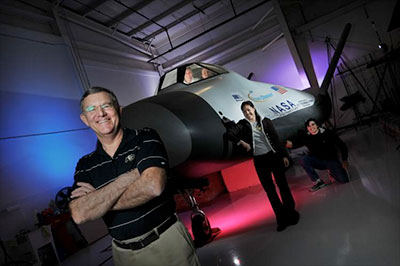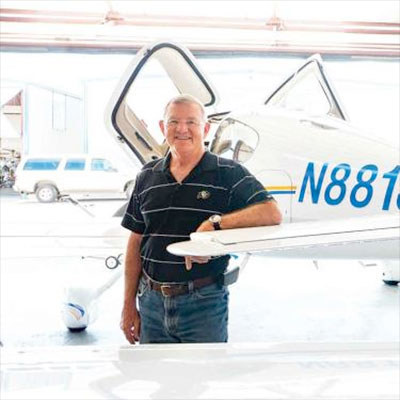Astronaut professor launching into retirementFrom training as an Army Ranger and flight test engineer, to life as an astronaut in the microgravity of space, to educating the next generation of aerospace engineers, Jim Voss (MAero'74; HonPhD'00) has a list of career achievements a mile long.
Now he is taking on a new challenge: retirement.
A scholar-in-residence in the Ann and H.J. Smead Department of Aerospace Engineering Sciences, Voss has served as a faculty member at CU Boulder since 2009.
He has also taught at Auburn University and West Point and worked in the commercial space sector as Vice President for Space Exploration Systems at Sierra Nevada Corporation and its predecessor, SpaceDev.

Above: Voss at Sierra Nevada with students and a Dream Chaser mockup.
What led you to pursue engineering as a career?
My older brother was in engineering at Auburn at the time and I didn't know what I wanted to major in. He said to pick engineering because it's very broad, and I could move from that discipline to almost anything else easily.
I found the math parts very difficult. I really questioned whether engineering was the right thing and thought about switching over to physical education. I was wrestling for Auburn and thought I would like coaching that. But I stuck with it and finished with my Aerospace Engineering degree.
When did you decide to apply to the astronaut program?
I've always liked space and I like reading science fiction. Growing up we didn't have a human spaceflight program yet, so even the idea of going to space was science fiction, but it always sounded really interesting.
In 1978, when I was stationed in Germany, there was a little tiny article in the Army Times that NASA was creating a new vehicle and would need engineers and scientists to be astronauts and you didn't have to have perfect vision. When I read that I thought they'd created the program just for me.
I applied, but didn't get selected because I wasn't qualified at that point.
How long did it take before you were accepted?
I applied five times over nine years.
Each time I was improving and had done things that made my application stronger.
Getting declined feels pretty bad. You know it's a tough application and only a few people get selected, but it's hard to accept you're not good enough. To go through it multiple times you wonder if you're ever going to be good enough.
What were you doing to improve your application prospects?
I did things in my career that were interesting to me that I also knew were relevant to NASA.
I was always interested in flying, so I got my private pilot's license.
Then I saw a note about the Naval Test Pilot School, which is where the Army sends its pilots. I was being recruited for the Army Aviation Research and Development Command, but I asked my assignments guy if I could be sent to the test pilot program first. I thought it would help at the R&D command if I was trained to be a flight test engineer.
He said, "You're not going to test pilot school. You're an infantry guy," but I got bold and wrote a letter to the responsible general officer about it and he got me assigned to test pilot school.
I'm convinced that program had a big role in me eventually being chosen as an astronaut.
The one thing I didn't do was get a PhD. It would have been just for my application, and that didn't appeal to me.
You were selected in 1987 and had your first spaceflight in 1991. What is it like working in microgravity?
Floating around in microgravity is a pretty neat thing. I like being able to move really heavy things around and do weird moves and flips in space. From a sensory perspective, it's almost overwhelming because it's very different. You can be upside down or in any orientation.
You have a different perspective on volume when you're floating around. You can use all the volume. You're not limited to the floor. You can have someone lying up on the ceiling and they feel out of the way. Your perception changes.
You share the record for the longest spacewalk in American history at eight hours and 56 minutes. Was that planned?
We had no idea when we were out. It wasn't until we got back inside that they said, 'You know that's the longest spacewalk ever.'
Wow, I knew I was tired and getting thirsty.
Had I known we were at 8:56, I would have stayed out for four more minutes to hit nine hours.
You flew on five shuttle missions. What led you to retire from the astronaut program?
There were three of us on my final flight and we were giving an interview from ISS. The interviewer asked if we would sign up for another mission. Yuri Usachev and I both said this was probably our last flight. Susan Helm said she wasn't sure. It ended up being the last for all of us.
We trained for four years for the mission and a lot of that was spent in Russia. I thought I'd done everything I wanted to do, and I didn't want to go through another couple years of training. It was time to do something different and I wanted to teach again.
You've had multiple assignments in Russia for NASA. How is your Russian?
I'm not a language person. Before going the first time, I got a couple months of very part-time instruction, but when I got to Russia my Russian was really not good.
We didn't have any interpreters. None of the training materials were in English and almost nobody spoke English.
I really had trouble since I spoke it poorly; I wanted to speak it correctly. Roscosmos provided a Russian instructor and I spent every morning doing training and I eventually got there. After a year I could communicate well.
How does teaching at West Point compare to CU Boulder and Auburn?
I enjoy all the undergraduate and graduate students I've taught. I enjoy the interaction with them and seeing their enthusiasm. The difference at West Point is the students are very disciplined. If you were boring as an instructor—as sometimes happens— and they were sleepy, they would stand up behind their desk to pay attention.
How does space mission training compare to actually being in orbit?
The actual mission is a lot easier than the training. NASA needs you to be ready for anything, so during the training they're intentionally causing malfunctions. Once you actually get up there, everything's not breaking around you.

Above: Jim Voss with his Cirrus SR22.
What do you have planned for retirement?
I still enjoy flying and working on my airplanes. I have a Cirrus SR22 and a Rutan Long-EZ experimental aircraft I built myself. I spend a good bit of time doing maintenance on them. They keep me pretty busy.
My wife and I would like to travel more, although I think she's worried I'm going to miss teaching.
We have a lot of travel plans. We went to Egypt when we were younger and are interested in visiting again. I'd like to go to New Zealand and go back to southern Africa. Our next big trip will be to Brazil this fall for the annual Association of Space Explorers Congress. I expect to stay busy in retirement, but will miss my CU students and colleagues.













